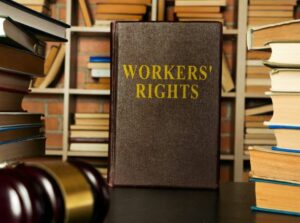In some cases, a workers’ compensation settlement is community property in California. California law considers any income earned by a spouse during the time they are married community property. This means they split it as a part of the property division during divorce. Since workers’ compensation settlements include money for missed income, this is also community property.
However, settlements that include future income because of permanent injuries could differ. You should consult with your workers’ compensation lawyer and divorce attorney to determine your options.
California Property Division Laws: What Do They Entail?
Each state handles property division differently. In some areas, any income you earn during a marriage belongs to you. In others, it goes into a marital pot known as “community property.” This is true of any assets or purchases you make, too.
California is a community property state. Anything you earn—or receive in lieu of your wages—during your marriage is community property. If either partner earned it during the marriage, it belongs to both spouses. Unlike many other states, California insists on an equal split of shared assets, not an equitable division.
Individuals do have separate property in California. Under California Family Code § 770, this only includes property (and money) the spouse acquired before the marriage, by gift, or by inheritance.
Workers’ Compensation Considerations When Thinking About Divorce
Workers’ compensation insurance generally works by paying injured employees for their time away from work while they recover from their injuries. In most cases, this lasts a few weeks or months, and they heal and return to their job. This rarely becomes an issue in a divorce.
However, sometimes, workers with lasting injuries receive a lump-sum payment that compensates them for their current time away from work, as well as future missed income. This is when a problem arises during a divorce. Only the compensation for income missed during the marriage is community property.
According to case law—Marriage of Ruiz (2011) 194 Cal.App.4th 348—the money meant to compensate the injured worker for their income losses before they married or after separation belongs to that individual alone. This is also true of money meant to cover future medical care related to their on-the-job injury.
Unfortunately, this money is rarely earmarked specifically for current and future uses. This can admittedly complicate matters, but you have the right to partner with an attorney who can help.
Options for Property Division of a Workers’ Compensation Settlement
There are generally three ways the division of a workers’ compensation settlement can go. This includes:
The Settlement Is Earmarked for Specific Purposes
Sometimes, the workers’ compensation settlement will come already divided. There will be information about how much the insurer intends for the worker’s missed wages to date, their future missed income, and their future medical care. When this occurs, it just takes some math to determine how much was left at the separation date. This allows all parties involved to quickly see what is community property and what is separate property.
The Parties Reach an Agreement
One of the easiest ways to handle a workers’ compensation settlement in a divorce (and the one that causes the least contention) is for the parties to negotiate an agreement. Settling a divorce is much easier, quicker, and cheaper than going to trial. If you and your partner can put aside your anger and frustration for a little while, it may be possible to agree on a plan that works for you both.
Having your own divorce lawyers participate in this process is often necessary. They can help you understand how much a judge might award if the case goes to court. Trained mediators can also guide this process and provide key information when needed.
The Judge Decides
These cases are often contested. The injured worker fights for the settlement they paid for with their own pain and suffering. However, this is not how the law applies in California. If the settlement is not already designated for specific purposes, and the couple cannot reach an agreement, the judge hearing the case will need to divide the community property between them.
This means the judge must analyze the settlement and determine how much was for previous and current missed income and how much is for future uses. This could require reviewing the workers’ compensation case’s documents, calling in experts, and taking other steps.
Steps You Can Take During Your Workers’ Compensation Case
Sometimes, it is possible to break down the parts of a workers’ compensation lump-sum settlement during negotiations. If your agreement shows how much you received for your wage losses to date, future losses, lasting disabilities, and future medical care, it is easier to determine what is community property and what is not during a divorce.
However, most people are not considering how to separate marital property while fighting for a workers’ compensation payout. Instead, attorneys usually reach deals that focus on an overall total. Any records you have documenting the possible value of each type of loss could be important, though.
If you are going through a divorce or considering filing for divorce and recently suffered injuries, you will likely want to work with both your divorce attorney and a Los Angeles workers’ compensation lawyer to understand your options. While your divorce lawyer will ensure you get a fair property division settlement, your workers’ compensation lawyer will fight for the money you deserve and take steps to limit what is community property in the divorce.
Discuss Your Options With Our Legal Team for Free Today
At KJT Law Group, our team helps clients navigate even the most complex legal situations. We can help you fight for workers’ compensation benefits, negotiate a lump-sum settlement, or better understand how much of your settlement is community property during a divorce. We are here for you. We provide free case consultations. Contact us now by calling (818) 507-8525 now. We have someone available to take your call.



